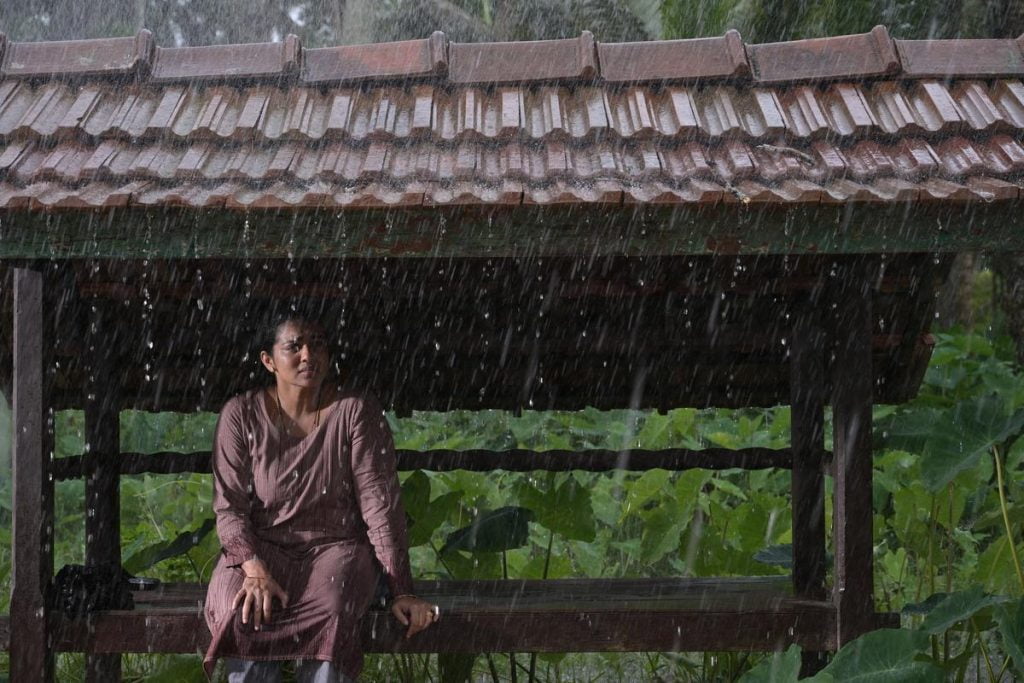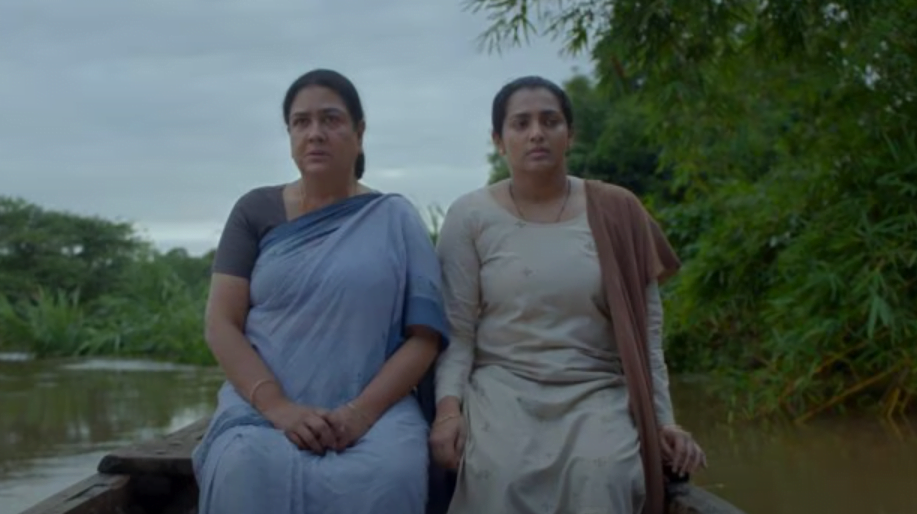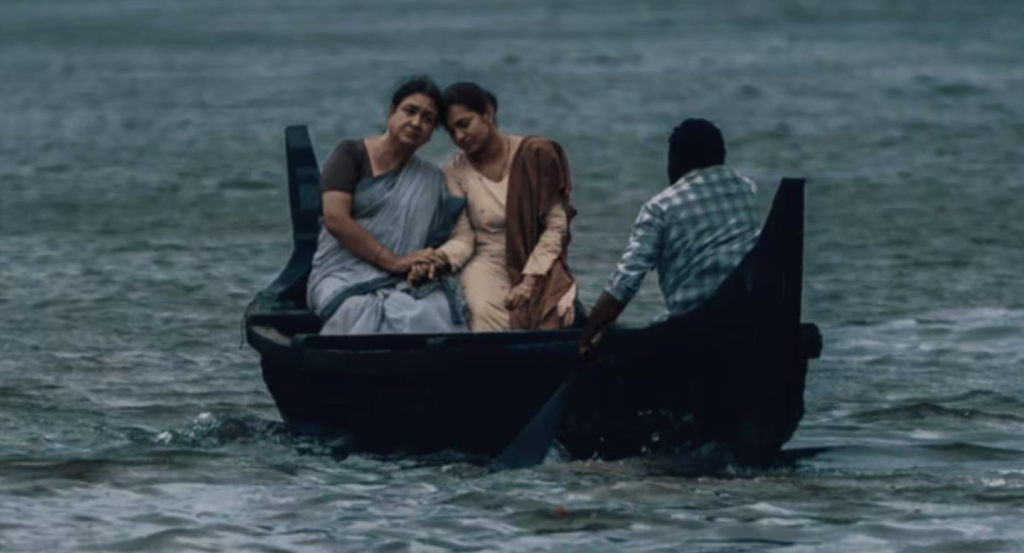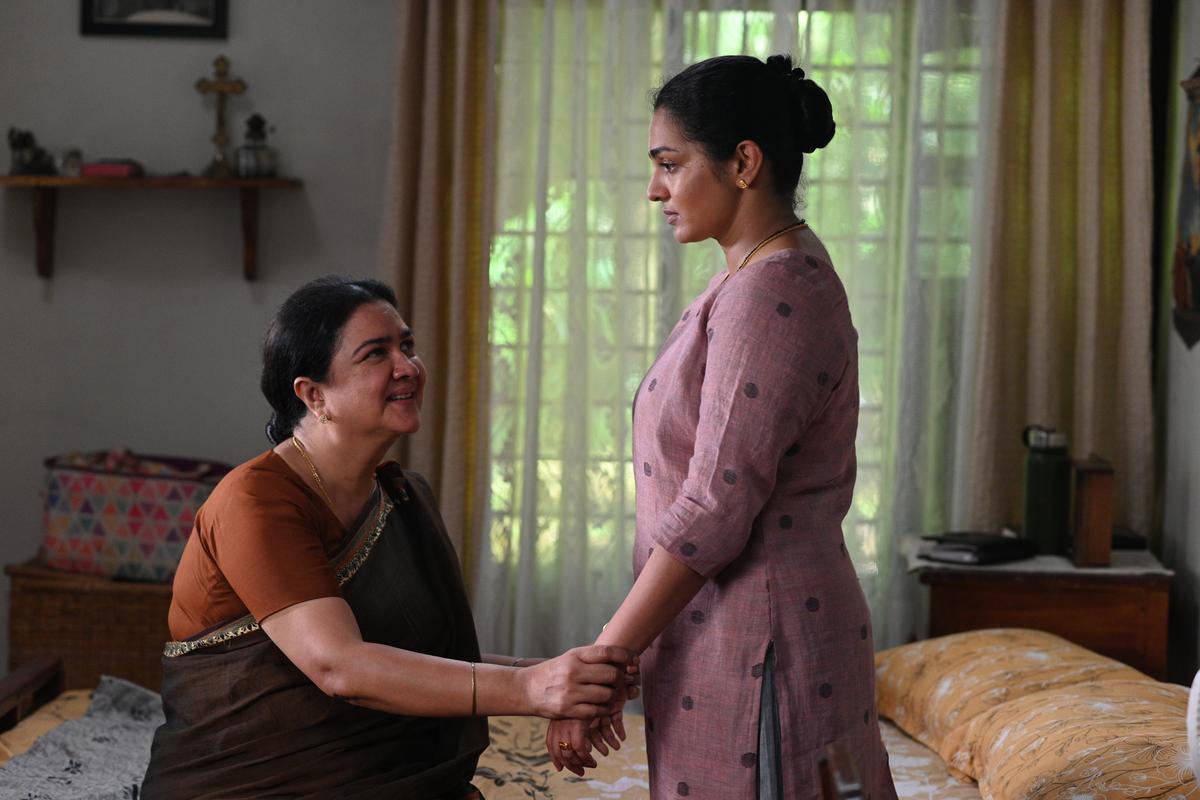Written and directed by Christo Tomy, ‘Ullozhukku,’ (translated to undercurrent), hit the theatres on June 21, and it has been flowing ever since in the hearts of film lovers. Finally to see a film with two women characters on the poster, in between the recent commercial hits ruling the theatres, ‘Ullozhukku,’ was indeed a change the Malayalam film audience needed.
Ullozhukku is all about the two main characters, the daughter in law – Anju (played by Parvathi Thiruvoth) and mother-in-law, Leelamma (played by Urvashi) and the character Thomaskutty (played by Prashanth Murali) who connects these two women and tangles their lives together.
Different from the old films having villainous relationships between inlaws we see how Anju and Leelamma are somehow empathetically connected and share no grudge. Before the audience delves into their characters further individually, we see how both Anju and Leelamma are two sides of the same coin, both living a life they did not choose, surviving through a battle of emotions buried under their heart.
On the surface level, all we see is a middle-class family that is taking care of each other, with no big troubles or violence and a sense of silence flows through each character. But taking a closer look at each other, you see a war of emotions, secrets, driving force in life or purpose, or redemption from living for the sake of society. This is a film that slowly puts out a question to the viewers, when it comes to the matter of heart, who decides what is right and what is wrong? Or is there a middle ground apart from these two binaries?
The characters in Ullozhukku
Right from the first scene of a small recap of Anju’s life to her current life environment, we see she has settled into a life she did not volunteer for. Later we see a grieving mother, Leelamma, buried in pain trying to hold onto the memories of her family life with the hope of seeing her son live a healthy, pain-free life. Before the audience can think further, the director hurries us to see how they are surviving through all of these. We see Anju finding solace in her past lover, her only hope of relief. From here, It’s very easy to judge these characters by looking at their actions at first glance, the undermined layers of their rights and wrongs, and the troubles they go through can be a blindspot for anyone who sees it through a judgemental lens.

The conflict of Ullozhukku begins with the sudden demise of Thomaskutty, son of Leelamma and husband of Anju, along with Anju finding a way to hide a secret she learned meanwhile and how each viewer perceives it, the bias they show can differ from perspectives. One thing is for sure, you can see a villain in every character, only to realise towards the end that everyone is stranded, and all of them have their grey side, just like all of us living the life we believe is the right way to be living.
Tides within heart: Different layers of human emotions in Ullozhukku
The major part of the Ullozhukku happens during the days from the death of a beloved one-Thomaskutty, to the day he is buried, the days of the flood. The film travels through the tides, floods and rains that happen in Alappuzha as a background, all of it witnessing the conflicts, unfolding of secrets and sorrow of the characters living under the same roof. In one way, it is not about the undercurrent that happens outside but more about the tremendous rains and tides happening inside the heart of these characters. Finally, it is all out, flowing without any filter, not knowing where it ends, or how it ends.

The film and the writing with apt points of triggers to evoke emotions slowly, we see why these characters are beyond the rulebook of a happy family. We are tempted to understand deeply, their rights and wrongs, their pain and hope, we look beyond their actions.
In the Ullozhukku, initially, to an extent, we tend to root for Leelamma, the mother whose only purpose in life is the happiness of her children and who is content by reminiscing the old memories her late husband left her with.
The writing evokes a thought in us who deserves this much pain? But, the underlined layer of sacrifice the character has to go through to willfully forget the happiness she deserved, the way she got conditioned into thinking ‘this is enough,’ is revealed later when the conflict of other characters comes to the forefront. She is not just a mother who hopes for her son to lead a healthy life. She was a young girl who had to settle into a married life she was not ready for, she took the role of mother at an early age and started living as a ‘mother,’ and ‘caregiver,’ forgetting her own identity apart from that.
The patriarchal conditioning shaped her into the mother she is now, living in a turmoil of many unsaid words. Did she ever feel love? By her husband? By her children? We see a sense of grievance when she mentions her life journey to Anju while reminiscing about her past. In one way or another Anju is Leelamma herself, and maybe that is why she listened to her, they somehow had an unexplainable bond that was devoid of the societal expectations of how things should be.
On the other hand, Anju is someone who is trying her best to find the life she missed in the chain of torture she went through when her family forced her to get married into a ‘good Christian family.’ We see her futile attempt to be a good wife vaguely until she encounters her past lover again. Later all we see is how she is a caregiver to her husband, runs the family along with her mother-in-law going with the flow. Her needs as a human being and her belief about marriage and love are different from societal expectations. As Leelamma, we cannot stop asking if she was ever truly loved by her husband. Did she fit into her new life or was she getting used to her life that was forced on her? The answer is revealed as we go further into the movie.
Who is to forgive? Who is to blame?
As an audience, we might choose to be on a character’s side and when we finally side with a character the film suddenly takes a turn to show their grey areas, their parts that were not visible so far to us, their mere efforts and points that are more like a justification to the errors each of them made to survive in life. From talking with immense empathy to each other, we see how Leelamma and Anju’s tone toward each other changes with revelations about each other and their lives. There is a peak of emotions, anger, sorrow, sense of hope and redemption.

In a scene where Leelamma and Anju have a conversation in front of the dead body of Thomaskutty, it is revealed how much or how little they have understood each other and the people around them. That is when we as viewers take a deep dive into their backstory raising many questions. Isn’t Leelamma a product of patriarchal norms and societal expectations? Isn’t Anju, a wounded girl who was unheard of by her parents left to a life that she was not ready for? Even Thomaskutty, isn’t he a deeply hurt son who wanted love from his father and finally settled for a watch that reminds him of the breadcrumb love he received? Did they know what love was? Didn’t all of them deserve true love and a safe space to be their true self? Didn’t all of them try to find it only to be stranded like the house that witnessed their emotional journey throughout these years?
In short, to see a film driven through the emotional journey of the main characters, the turbulence of emotions until we see, who truly makes the right and wrong decisions in life, the film itself is a turbulence of emotions as we travel through each character, be it the parents who failed to listen to their children and provide the love they needed, the late father who did not give the bare minimum love for his son, or the daughter who did not try to understand her mother.
Amidst all of the chaos, redemption and realisation they went through, there is a scene where Leelamma and Anju sit under the same umbrella shown towards the end. The director did a wonderful job of capturing their bond and how they turned to one another against many norms. It’s possible that when they were united under that umbrella, with no words said, while the rain was pouring down heavily, finally, they might have felt as though their hearts stopped pouring.



